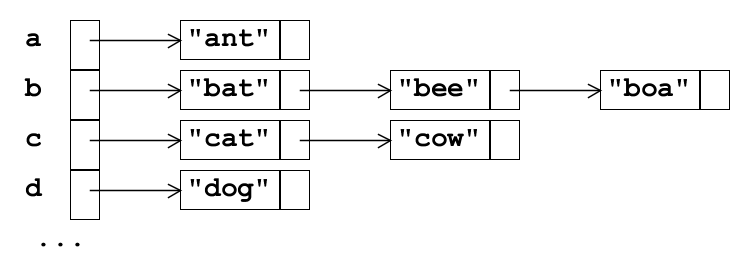Hash table picture
Here is a 26-entry hash table for three-letter animal names:

On the left is an array of pointers, pictured vertically, indexed by
0 up to 25 by subtracting 'a' from the
first letter
For fixed data in an ordered array, the binary search algorithm gives O(log(n)) search
For data which varies, a binary tree gives O(log(n)) search, provided it is kept balanced
Can we search any faster?
Yes!
We can use hash tables
Suppose we have a set of words, a dictionary, and we want search repeatedly to see if a word is included
And let's suppose the words contain only lower case letters
We can speed up search by using an array with 26 entries, one for the words starting with each letter
Suppose each array entry contains a linked list
Here is a 26-entry hash table for three-letter animal names:

On the left is an array of pointers, pictured vertically, indexed by
0 up to 25 by subtracting 'a' from the
first letter
This hash table could reduce the lookup time to n/26, but
there are two problems
First, if the words are not evenly distributed between the 26 slots (about
the same number in each), then the search time will be worse than
n/26
Second, n/26 is still O(n), and we want less than O(n), in fact
less that O(log(n))
A function which calculates a number from a string (or other data) is called a hash function
We have been using h = s[0] - 'a'
We want (a) the number to be pseudo-random, so that the words generate a good spread of numbers (b) all of the letters to contribute (c) the numbers to be ints, so that large hash tables can be used
As with pseudo-random number generators, you should be careful not to invent your own bad one
The first one in the Java language used only a few
characters at the start and end of a string, which made it bad for URLs
(lots of URLs got the same number, e.g.
http://www.../index.html)
Now the Java hash function for strings is
for (..i..) h = 31*h + s[i] ignoring
overflow (and it is cached for efficiency)
To reduce search time below O(n), you need a hash table size which is roughly equal to the number of items to be stored
One way is to choose something big and hope the speedup is enough
Another way is to estimate the amount of data in advance
Another way is to make the array dynamic, rehashing all the items into the larger table each time you increase the size
A number from a hash function has to be turned into an index, usually just
by forming h % size to give a number from 0 to
size-1
Most hash functions have a weakness - the least significant bits are not very random
So one (old) approach is to choose a table size which is
a prime, so that h % size is still well spread
Better is to design a hash function where the least significant bits are more random, so that arbitrary hash table sizes can be used